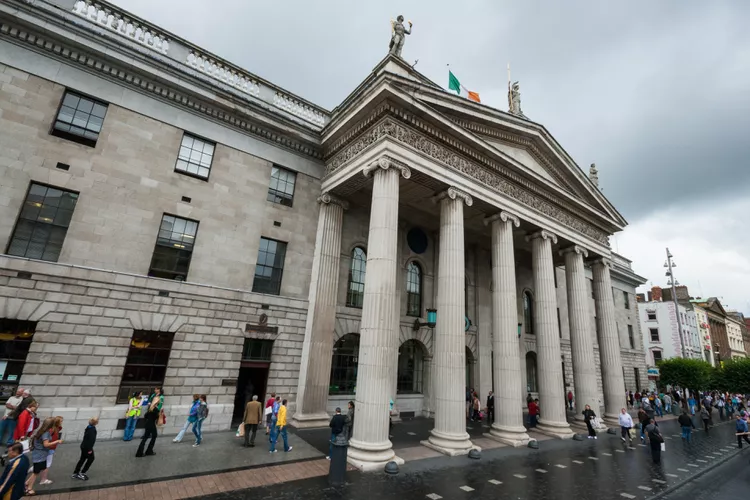1. Overview of the Proclamation
2. The Content of the Proclamation
3. The Historical Impact of the Easter Rising
Printed in conflicting typefaces and plastered all over Dublin on Easter Monday 1916, a single proclamation kicked off an Irish rebellion. The full text of the actual proclamation of the Irish Republic was just six paragraphs long but it rallied against hundreds of years of British rule.
The Proclamation of the Irish Republic was read out in front of Dublin’s General Post Office on April 24th, 1916 by Patrick Pearse. As you go through the full text, be sure to note the passage referring to the “gallant allies in Europe,” which in the eyes of the British marked Pearse and his co-revolutionaries as working together with the German Empire. This association, in times of war, meant high treason and consequently led to the death of the signatories at the bottom of the printed proclamation.
The proclamation itself declares some basic rights, most notably the right of women to vote. In this aspect, it was very modern; however, in other aspects, it seems very old-fashioned, mainly due to the hard-to-understand wording of some passages.
There are only a few copies of the original document remaining, but you may find souvenir reprints (often adorned with additional graphics) in almost every Dublin souvenir shop. Here, however, is just the bare text (capitals as in the original):
POBLACHT NA hÉIREANN
THE PROVISIONAL GOVERNMENT OF THE IRISH REPUBLIC TO THE PEOPLE OF IRELAND
IRISHMEN AND IRISHWOMEN: In the name of God and of the dead generations from which she receives her old tradition of nationhood, Ireland, through us, summons her children to her flag and strikes for her freedom.
Having organised and trained her manhood through her secret revolutionary organisation, the Irish Republican Brotherhood, and through her open military organisations, the Irish Volunteers and the Irish Citizen Army, having patiently perfected her discipline, having resolutely waited for the right moment to reveal itself, she now seizes that moment, and supported by her exiled children in America and by gallant allies in Europe, but relying in the first on her own strength, she strikes in full confidence of victory.
We declare the right of the people of Ireland to the ownership of Ireland and to the unfettered control of Irish destinies, to be sovereign and indefeasible. The long usurpation of that right by a foreign people and government has not extinguished the right, nor can it ever be extinguished except by the destruction of the Irish people. In every generation, the Irish people have asserted their right to national freedom and sovereignty; six times during the past three hundred years, they have asserted it in arms. Standing on that fundamental right and again asserting it in arms in the face of the world, we hereby proclaim the Irish Republic as a Sovereign Independent State, and we pledge our lives and the lives of our comrades in arms to the cause of its freedom, welfare, and exaltation among the nations.
The Irish Republic is entitled to, and hereby claims, the allegiance of every Irishman and Irishwoman. The Republic guarantees religious and civil liberty, equal rights and equal opportunities to all its citizens, and declares its resolve to pursue the happiness and prosperity of the whole nation and of all its parts, cherishing all of the children of the nation equally, and oblivious of the differences carefully fostered by an alien Government, which have divided a minority from the majority in the past.
Until our arms have brought the opportune moment for the establishment of a permanent National Government, representative of the whole people of Ireland and elected by the suffrages of all her men and women, the Provisional Government, hereby constituted, will administer the civil and military affairs of the Republic in trust for the people.
We place the cause of the Irish Republic under the protection of the Most High God, Whose blessing we invoke upon our arms, and we pray that no one who serves that cause will dishonour it by cowardice, inhumanity, or rapine. In this supreme hour, the Irish nation must, by its valour and discipline, and by the readiness of its children to sacrifice themselves for the common good, prove itself worthy of the august destiny to which it is called.
Signed on behalf of the Provisional Government:
THOMAS J. CLARKE
SEAN Mac DIARMADA
THOMAS MacDONAGH
P. H. PEARSE
EAMONN CEANNT
JAMES CONNOLLY
JOSEPH PLUNKETT
3. The Historical Impact of the Easter Rising
The 1916 Easter Rising may have failed, but it left a significant impact on Ireland, ultimately changing the course of history for the entire country. This event is essential for understanding Ireland’s journey towards independence and sovereignty.





